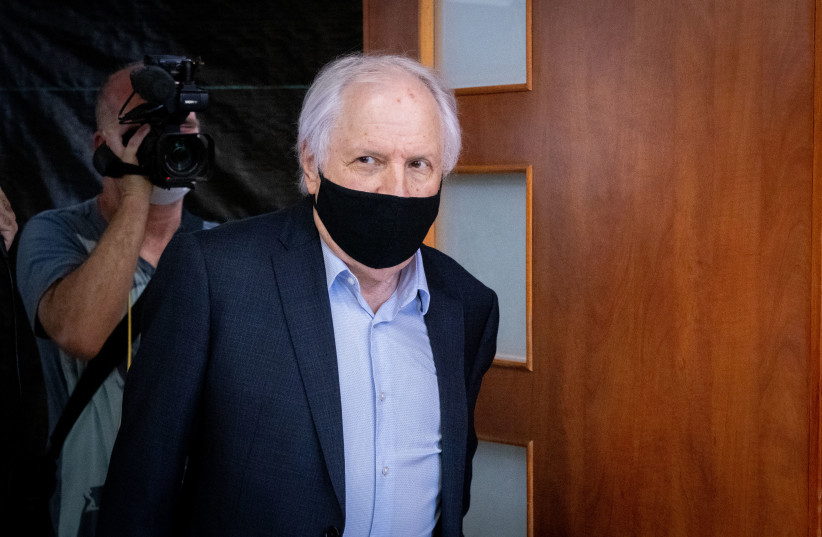The state prosecution’s presentation of Walla employees’ testimony in the public corruption trial of former prime minister Benjamin Netanyahu concluded on Monday with the testimony of former news desk editor Amit Eshel.
Starting on Tuesday, the prosecution is expected to reconstruct for the Jerusalem District Court the part of its Case 4000 narrative relating to the telecommunications giant Bezeq, leading off with former Communications Ministry director-general Avi Berger.
According to the state, Netanyahu engaged in a scheme with Shaul Elovitch, owner of both Walla and Bezeq, to set favorable government policy for the telecommunications company for NIS 1.8 billion in exchange for systematic control of news coverage relating to him and competitors at Walla.
Netanyahu and Elovitch deny the charges, claiming that they merely tried to receive fair coverage for the former prime minister from Walla, despite anti-Netanyahu undercurrents.

Following the testimony from April until October 11 of former Walla CEO Ilan Yeshua, Berger is the next major witness in the case.
Since October 11, three other senior Walla editors testified and were cross-examined, including former chief editor Aviram Elad, former news director Michal Klein, and Eshel.
Elad and Klein collectively testified that Yeshua or another Walla chief editor, Avi Alkalai, regularly gave them orders to give Netanyahu positive news coverage, and to report negative news coverage on his rivals, such as Naftali Bennett, Isaac Herzog or Meni Naftali.
Naftali successfully sued the Netanyahus for a range of employment law breaches in the civil courts, and helped initiate the Prepared Food’s Affair trial against Sara Netanyahu, which led to a minor conviction and tremendous embarrassment.
On Monday, Eshel testified that she and the rank-and-file employees of Walla all clearly understood that any articles relating to the Netanyahu family could not be posted without being specially screened by Alkalai and senior management.
Eshel specifically noted a negative article about the Netanyahus by former Walla legal reporter Gali Ginat – which was summarily removed from the website with no explanation – as an example of how aggressive the pro-Netanyahu forces controlled the news.
She was then asked by Judge Moshe Bar Am if this could have been her own subjective feeling.
She responded that the special procedures applied to handling Netanyahu articles – in terms of delayed reports and multiple levels of approvals and regular interventions – were so overwhelming that the problematic interference was clear to all Walla employees.
Eshel said she was sometimes told she needed approval from Alkalai for posting Netanyahu articles, even though she had no regular interaction with him, and viewed him as multiple levels above her standing in Walla’s chain of command.
The defense lawyer for Elovitch’s wife, Iris, who is also a defendant in Case 4000, initially objected that Eshel was only conveying rumors, and not first-hand knowledge.
The court overruled this objection, while cautioning Eshel to limit her testimony to issues about which she had first-hand knowledge.
Defense lawyers for Netanyahu and Shaul Elovitch attacked Yeshua’s character as an off-the-rails CEO who interjected business considerations into news reporting for a wide range of politicians, including Herzog, Avigdor Liberman, Avi Gabbay and many others.
They also argued that Yeshua undertook many interventions on his own, without any request from Netanyahu or Elovitch.
The lawyers said that Elad, Klein and Eshel had no direct interaction with Netanyahu or any of his aides, such that they only needed to defeat Yeshua’s narrative in order to prove their clients’ innocence.
Though Alkalai may later add some testimony to the Walla narrative, at this stage the case turns to Berger and the prosecution narrative that Netanyahu fired the former Communications Ministry official in 2015 for blocking allegedly problematic policies to favor Bezeq.
One policy shift was approving the Bezeq-Yes merger, which is at the heart of Case 4000.
A second shift was moderating price changes and competition against Bezeq.
In place of Berger, former Netanyahu campaign manager Shlomo Filber took over the Communications Ministry and pushed through the prime minister’s desired policies.
Filber denied wrongdoing for years, but eventually turned state’s witness against Netanyahu in early 2018, which many say was the tipping point that led Attorney-General Avichai Mandelblit to conclude that he was obligated to indict Netanyahu.
After Berger, former Competition Authority official Dror Shtraum and former deputy director-general for finance of EUROCOM Felix Cohen are expected to testify on communications policy issues.
